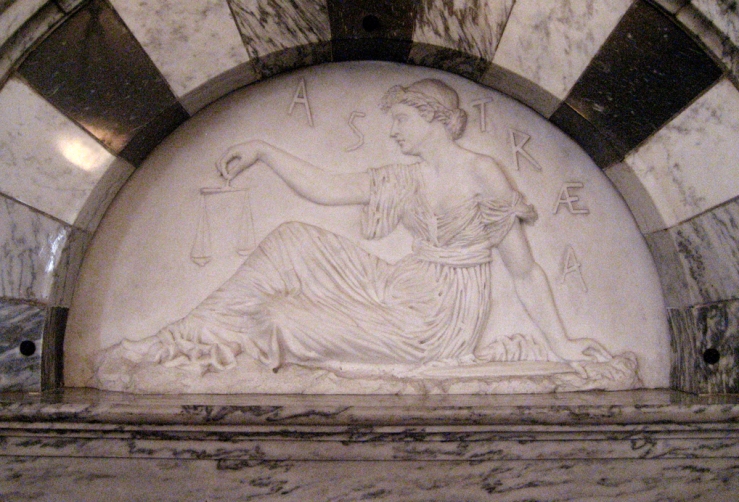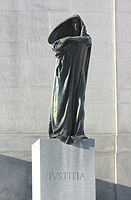Classical Greece and Rome had a major influence on modern western politics. Greek Demokratia, kratos (Power) and Demos (people) come to mind when thinking about politics. In classical Greece and Rome, the city was ruled by the people for the people, and people would vote for who got to be in power. All of this happened in every city-state in Greece (polis), which is a place or region that makes up a territory of political self-governing city.[1] The whole idea of this political structure was to involve as many people as possible in order to make up a functioning city. We can see the parallels to modern government in our justice system, democracy, the idea of “ruling for the people by the people.” Perhaps there are some major differences, for instance the allowing of women to vote, but one can easily trace our democratic roots all the way back to ancient Greece.
The idea of divine ruler ship also come to mind when thinking about influences from ancient Greece and Rome. The Emperors in Rome were considered to be gods by the people under their ruler ship. The councils of Greek city states would hold the Gods and Goddesses in regards to the highest authority. A parallel that can be seen here is that to Papal authority from the middle ages. The Pope would elect a king as the holy roman emperor, if the circumstances warranted it. However, God would still have the position of highest authority in the political structure, much like how Greek city states held certain Gods and Goddesses, like Zeus, in higher authority.
Here is a historians take on the influence of the United States in particular, but can be applied anywhere.
“They were steeped in, soaked in, marinated in, the classics: Greek and Roman history, Greek and Roman ideas, Greek and Roman ideals. It was their model, their example. And they saw themselves very much like the Greeks and the Romans, as actors on a great stage in one of the great historic dramas of all time, and that they, individually and as a group, had better live up to these heroic parts in which history had cast them. That’s a powerful motivation”. —Historian David McCullough, in a speech at DePauw University.
Greek Myth and its influence on laws and justice in western politics
One way Greek Myth influenced western politics was through the way of justice. One particular figure in Greek myth who was especially influential was a goddess known as Themis, but popularly known as “the lady of justice.” The lady of justice was a Greek goddess who was a large figure in the area of politics because she inspired the people to be just and righteous. Today our laws and judicial systems are derived partly from her stories and ideals. She began in Greek mythology at around 800 B.C. as one of the Titan gods. Each god held the power of law, with Themis acting as the goddess of the order of the natural world. That means she ordered and organized certain systems. For example, winter follows summer, which then follows spring (There was no fall in Greek mythology). She also planned and ordered the path of a person’s life such as its beginning and end. Most importantly however, she ordered and arranged what was to happen during each season to both nature and man. It later followed that Caesars, Kings, aristocracy and ordinary people sought her advice and council on all the laws of nature as well as the laws of man’s concerns. There was much advice and counsel to be given on man’s trepidations like farming, war, love, work and marriage. [2]
Themis is also known as Lady Justice (Justitia), who is the roman personification of the Greek goddess[3]. Many of Lady Justice’s statues are erected in many court houses around the world, such as the Palace of Justice in Italy, Supreme Court of Canada in Ottawa, and the Shelby Court House in Tennessee, U.S. seeing how she is a representation of modern day law, it is evident that Lady Justice has become a symbol of law and justice throughout the world.
Other than that, there is a direct connection between Dike and western culture today. Dike, daughter of Themis and Zeus, is the goddess of human laws and rights, and gives punishments to those who accused of crimes.[4] A relief of Dike can be found in the Vermont State House today. Dike being the goddess of Human Justice, established laws and customs to Greek politics. This must mean that the U.S used her as a symbol of their laws and order, hence the usage of the Vermont State House being a place which represents U.S law.

Write up by Tristan Hubbard
(Research done by Andrew Jahn and Tristan Hubbard)
[1] Sarah Pomeroy, Stanley Burstein, Walter Donlan, Jennifer Tolbert Roberts, A Brief History of Ancient Greece, second edition. Oxford University Press. 2009 Print.
[2] The Lady Justice Story Fountain at the Bexar County Courthouse San Antonio, Texas Gilbert E Barrera, Sculptor / Author
[3] www.sculpturesdomain.org, page 2, accessed Nov 30, 2015: http://sculptorsdominion.org/UserFiles/File/08LadyJusticePressCOPY.pd
[4] Hesiod, Works and Days, 248-264, accessed Nov 28, 2015: https://people.sc.fsu.edu/~dduke/lectures/hesiod1.pdf

